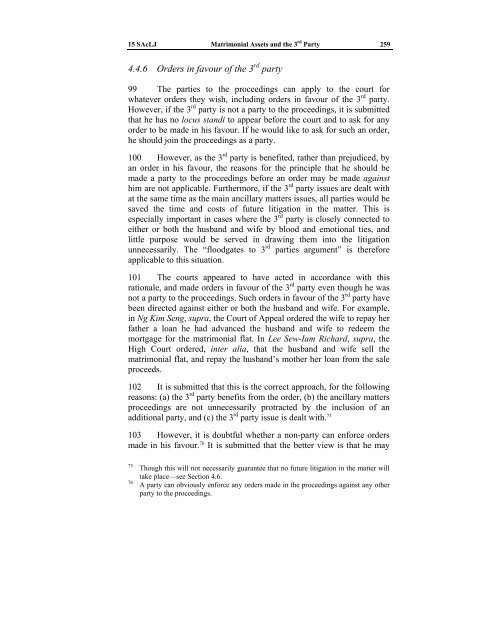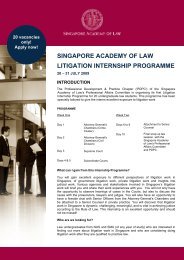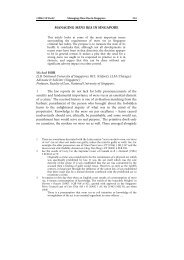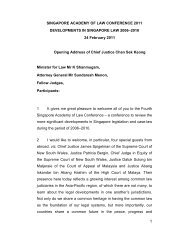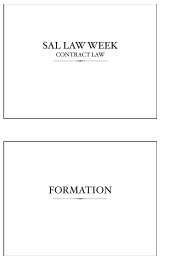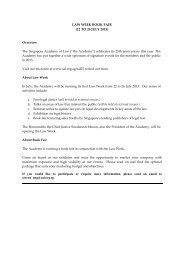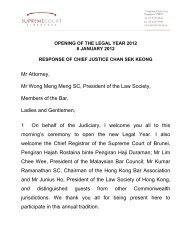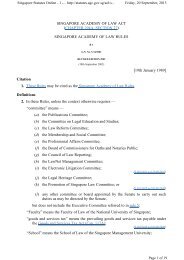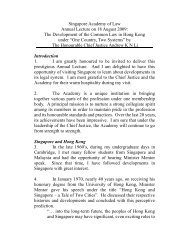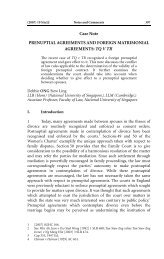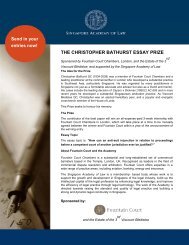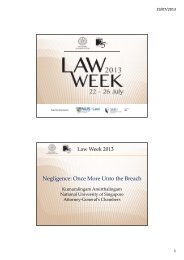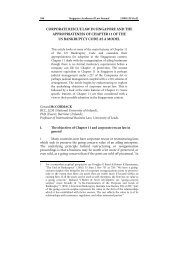View Article - Singapore Academy of Law
View Article - Singapore Academy of Law
View Article - Singapore Academy of Law
You also want an ePaper? Increase the reach of your titles
YUMPU automatically turns print PDFs into web optimized ePapers that Google loves.
15 SAcLJ Matrimonial Assets and the 3 rd Party 259<br />
4.4.6 Orders in favour <strong>of</strong> the 3 rd party<br />
99 The parties to the proceedings can apply to the court for<br />
whatever orders they wish, including orders in favour <strong>of</strong> the 3 rd party.<br />
However, if the 3 rd party is not a party to the proceedings, it is submitted<br />
that he has no locus standi to appear before the court and to ask for any<br />
order to be made in his favour. If he would like to ask for such an order,<br />
he should join the proceedings as a party.<br />
100 However, as the 3 rd party is benefited, rather than prejudiced, by<br />
an order in his favour, the reasons for the principle that he should be<br />
made a party to the proceedings before an order may be made against<br />
him are not applicable. Furthermore, if the 3 rd party issues are dealt with<br />
at the same time as the main ancillary matters issues, all parties would be<br />
saved the time and costs <strong>of</strong> future litigation in the matter. This is<br />
especially important in cases where the 3 rd party is closely connected to<br />
either or both the husband and wife by blood and emotional ties, and<br />
little purpose would be served in drawing them into the litigation<br />
unnecessarily. The “floodgates to 3 rd parties argument” is therefore<br />
applicable to this situation.<br />
101 The courts appeared to have acted in accordance with this<br />
rationale, and made orders in favour <strong>of</strong> the 3 rd party even though he was<br />
not a party to the proceedings. Such orders in favour <strong>of</strong> the 3 rd party have<br />
been directed against either or both the husband and wife. For example,<br />
in Ng Kim Seng, supra, the Court <strong>of</strong> Appeal ordered the wife to repay her<br />
father a loan he had advanced the husband and wife to redeem the<br />
mortgage for the matrimonial flat. In Lee Sew-Iam Richard, supra, the<br />
High Court ordered, inter alia, that the husband and wife sell the<br />
matrimonial flat, and repay the husband’s mother her loan from the sale<br />
proceeds.<br />
102 It is submitted that this is the correct approach, for the following<br />
reasons: (a) the 3 rd party benefits from the order, (b) the ancillary matters<br />
proceedings are not unnecessarily protracted by the inclusion <strong>of</strong> an<br />
additional party, and (c) the 3 rd party issue is dealt with. 75<br />
103 However, it is doubtful whether a non-party can enforce orders<br />
made in his favour. 76 It is submitted that the better view is that he may<br />
75<br />
76<br />
Though this will not necessarily guarantee that no future litigation in the matter will<br />
take place—see Section 4.6.<br />
A party can obviously enforce any orders made in the proceedings against any other<br />
party to the proceedings.


